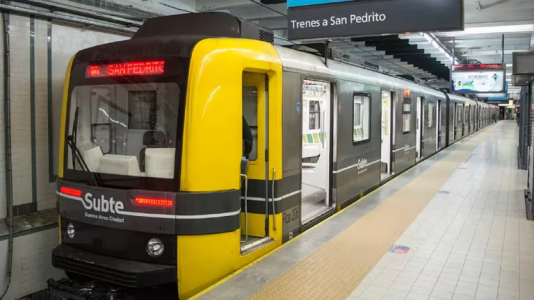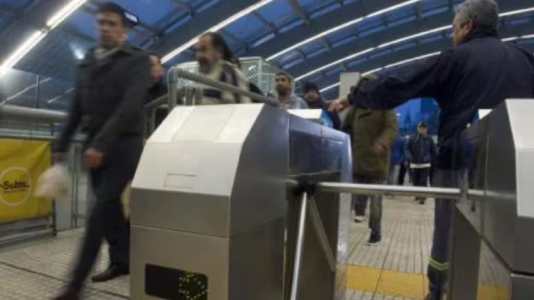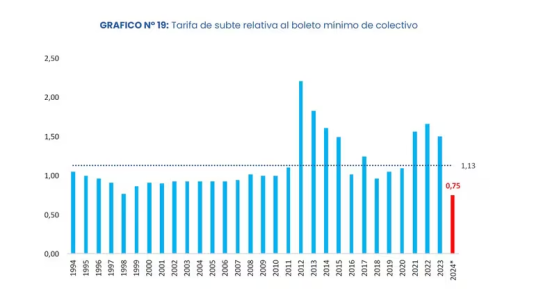All the Answers
Well-known member
There will be two strong subway increases in May: how much will the ticket cost? - Infobae

Source:

Habrá dos fuertes aumentos del subte en mayo: a cuánto va a llegar el boleto
El jueves se realizará la audiencia pública para aprobar el incremento en tres tramos que estaba previsto para comenzar en abril y se suspendió por problemas técnicos
April 22, 2024
By Agustín Maza

The "real" cost of the ticket, that is, without subsidy, is 859.07 pesos.
The government of the Autonomous City of Buenos Aires will hold a public hearing this Thursday to apply the sharp increases planned for subway fares . The increase was planned in three monthly tranches, although due to delays in the consultation process in May there will be two increases with about 15 days apart in May.
This is clear from the latest resolution of the company Subterráneos de Buenos Aires (SBASE) , which included a schedule of increases, and consultations made by Infobae to the Buenos Aires Ministry of Transportation :
- From May it will jump from $125 to 574 pesos
- About 15 days later it will jump to 667 pesos
- On June 1st it will reach 757 pesos
In February, the last Subway increase had been applied, bringing the ticket to the current $125. In the middle of that month, the City had reported a new roadmap for increases , given that the technical rate had remained at $859, which represents the “real” cost of the service without taking into account subsidies.

Red Sube and frequent passenger discounts are maintained. (Télam)
In search of reducing spending on subsidies, the Buenos Aires government defined a staggered increase in three sections: In April the ticket would go from the current $125 to 574 pesos. In May it would go to 667 pesos. Finally, in June it would jump to $757 per trip.
Meanwhile, for those who did not have their SUBE card properly registered, the proposal of the Buenos Aires authorities was that the Subway ticket would cost $859.07 from April and $300.67 for the Premetro.
In any case, these rates contemplated the continuity of the Red Sube discount and for frequent passengers. Also benefits for retirees, students, disabled people, among others.
To apply the increases in the public service, it is first necessary to hold a public hearing, although in this case it is not binding on the authorities' decision. The consultation was going to take place on Friday, March 15 through the Zoom platform.
However, there was a system crash that forced the process to be suspended, so citizens could not participate adequately. The hearing was postponed to April 25, as published at the end of March in the City's Official Gazette .
This rule provides that the first increase (from $125 to $574) will be applied “on the 5th day” of the publication of the resolution that makes it official. Meanwhile, the second ($667) will be launched “after 15 calendar days.”

Although it is not defined, official sources told this medium that the first increase will be applied before May 10, the second increase will be applied after 15 days, and by June the three planned sections will have been applied. That is to say that in June the subway ticket will cost 757 pesos.
The increases will be a blow to the pocket that will be added to those announced this Monday by the national government for the trains of the Buenos Aires Metropolitan Area (AMBA) starting next month. The minimum fare for metropolitan services will be worth $200, from the $130 it costs today. It represents an increase of 53% that also applies to tickets for longer sections.
In the coming days it will be decided whether or not there will be an update of bus fares based on inflation for the first quarter. Therefore, traveling on the AMBA can be much more expensive from May.
In the case of the subway, the enforcement authority reported that the intention was to maintain a ratio of 1.5 between the Subway fare and the bus fare, based on their average ratio over the last 3 years.
The Rates and Subsidies Observatory at the Interdisciplinary Institute of Political Economy (IIEP) , which depends on the UBA and Conicet , reported: “With the values originally proposed in the March Hearing, even with more staggered increases than those proposed, it would remain a very pronounced fare gap with substitute modes of transport. This situation probably promotes a diversion of traffic and a reduction in the potential income of the subway operator, EMOVA.”

